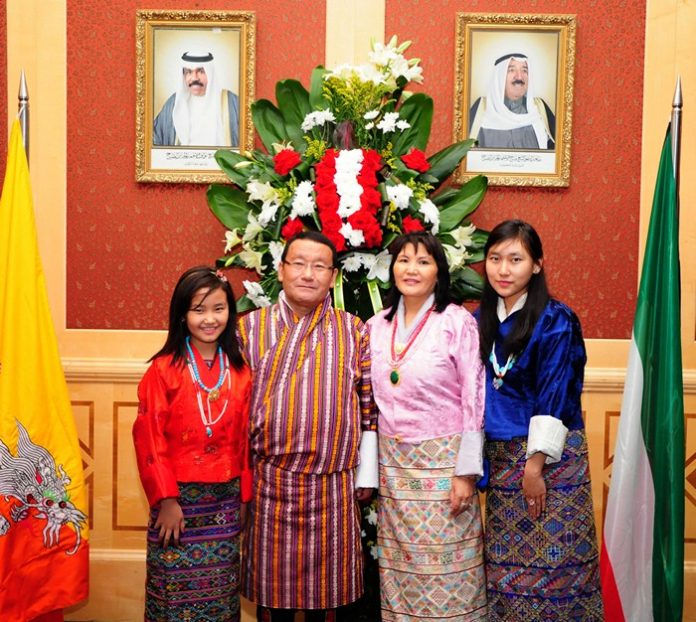Ambassador Tashi Phuntshog
On the auspicious and happy occasion of the 106th National Day of the Kingdom of Bhutan, which falls on 17 December 2013, on behalf of His Majesty the King, Government and the People of Bhutan, I take the honour to extend the warmest felicitations and Tashi Delek to His Highness the Amir of Kuwait, Sheikh Sabah Al-Ahmad Al-Jaber Al-Sabah, the Government and to friendly people of Kuwait.
As the Ambassador of the Kingdom of Bhutan to the State of Kuwait, it gives me great pleasure to express my deep satisfaction in the excellent relations between our two countries and remain confident that the bonds of friendship and cooperation will be further strengthened for mutual benefit of our two peoples in the years ahead.
I avail of this opportunity to convey our best wishes for the personal well-being and happiness of His Highness the Amir Sheikh Sabah Al-Ahmad Al-Jaber Al-Sabah and members of the Royal Family, and as well as for the continued peace, progress and prosperity of the people of the State of Kuwait.


Bhutan balancing GDP with Gross National Happiness

Bhutan is not just admired for its beauty but is also known for its remarkable development story among South Asian countries. It is one of the fastest-growing economies in the region with an average annual gross domestic product (GDP) growth rate of 5 percent.
The people of Bhutan play a leading role in the engine of prosperity of their country, fueled by pragmatism, hard work and a flood of individual enterprises. The country’s sound economic policies maintained consistently during the past decades, have contributed to steady economic growth. The government aims to achieve an economic growth rate of at least nine percent each year to become a middle income country by 2020.
The Asian Development Bank (ADB) in its report on Bhutan has forecast a growth rate of 8.4 percent for the current fiscal year and aims to align its future activities with the government’s upcoming 11th Five Year Plan for 2013-2018, and will focus on transport, energy, and urban development. Since 1983, ADB has approved $ 381.37 million in loans and grants, $ 50.5 million in technical assistance and $ 11.4 million in project grants from the Japan Fund for Poverty Reduction.

The Bhutan Government implemented economic reforms, beginning in 1999 and took an active role in guiding the nation’s economic development. The country’s economy remains strong as a result of public-private partnership that played a significant role in economic stability of the country. At present sectors such as agriculture, live-stock, timber, tourism, telecommunication, banking, construction and hydro-electricity are expanding rapidly.
Agriculture in Bhutan has been recently growing in quality and quantity. Currently agriculture and allied sectors such as forestry and logging employs nearly 60 percent of the population but accounted for about 35 percent of GDP. The country’s main agricultural products are rice, maize and wheat. Other major food crops are barley, oil seeds, potato, fruits and vegetables.

In this photograph taken on May 29, 2013, a Buddhist temple sits near an electricity grid main of the Chukha hydro power station in south-eastern Bhutan. Home to meditating monks and Himalayan nomads, the sleepy kingdom of Bhutan has set its sights on becoming an unlikely energy powerhouse thanks to its abundant winding rivers. Hydropower plants have already harnessed the country’s water flows to light up nearly every Bhutanese home, generating electricity that is sent to remote villages by cables strung through rugged mountain terrain. AFP PHOTO/Roberto SCHMIDT
On the development side, the energy policy of Bhutan is steered towards increasing the production of hydro-electricity in the country. Bhutan’s principal source of electricity generation comes from hydro electricity generation. The Government of Bhutan has ambitious plans to develop 10,000 Mega Watts (MW) of hydro-power by 2020. Bhutan’s state owned energy giant Bhutan Power Corporation Limited (BPC) has been an enormous source of strength for the economy of the country.
Tourism in Bhutan is experiencing sustainable growth for the last three decades due to the country’s natural and historical attractions, which appeal to visitors from all parts of the world. Nearly, 100,000 high-end foreign visitors arrive in Bhutan every year to discover this beautiful country and its rich historical heritage.
Bhutan has been ranked as the least corrupt country in South Asia, according to Transparency International, the world’s most credible measure of domestic and public sector corruption.
The concept of Gross National Happiness (GNH) with 72 indicators has its origin in Bhutan. Appreciating the importance of this measurement, the United Nations General Assembly has called on its member states to undertake steps that give more importance to happiness and well-being in determining how to achieve and measure social and economic development.
In a resolution adopted without a vote, the Assembly noted “the pursuit of happiness is a fundamental human goal” and embodies the spirit of the globally agreed targets known as the Millennium Development Goals.
Bhutan has also done well in achieving many Millennium Development Goals, but pockets of poverty still remain among its 720,000 people. As a landlocked nation, the government believes that Bhutan needs to work closely with neighboring countries to ensure it has efficient transport links, notably to seaports in Bangladesh, India, and elsewhere. Such regional cooperation is critical to ensuring the country’s future.

















